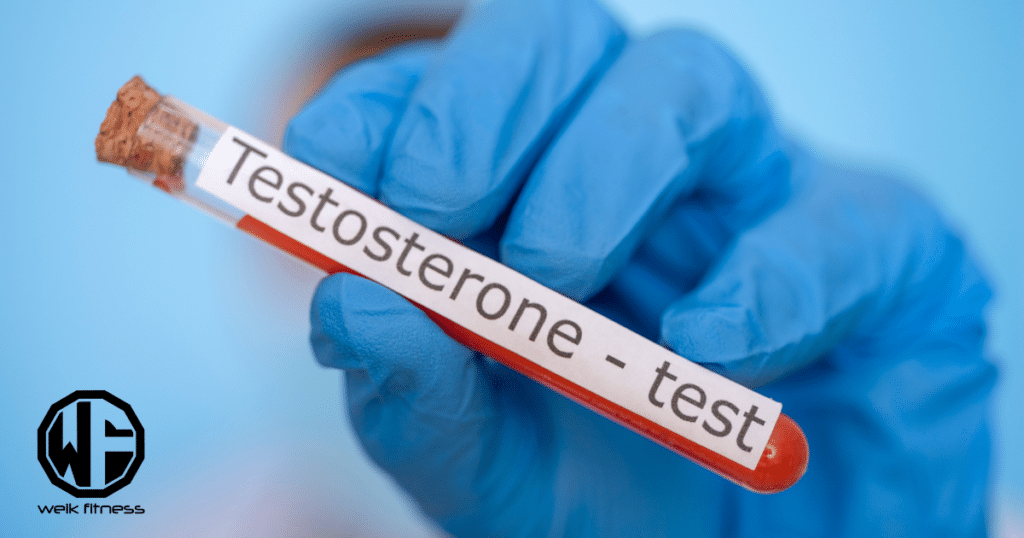Is Your Natural Testosterone Level Low? Here’s How to Fix It
Gentlemen, I have some good news and some bad news. Testosterone can be a finicky hormone throughout our lives. Our teenage years we seem to have an endless supply of testosterone flowing through our veins. Our natural testosterone level should be between 270 and 1070 mg/dL to be considered in the healthy and “normal” range.
Our levels tend to peak around the age of 20, and then slowly start to decline with each passing year. When this happens, many men can experience a low sex drive, hair loss, fatigue, an increase in body fat, a decrease in lean muscle mass, and an overall decrease in mood – which can cause a lack of focus and even depression. The good news is, all hope isn’t lost if you suffer from low testosterone.
Disclaimer: This article is for informational purposes only and is not meant to treat or diagnose any condition. It is recommended that you speak with your doctor before starting any exercise program, changing your daily nutrition, or adding any supplements to your regimen.
Table of contents

Why is Boosting Your Natural Testosterone Level Important?
Boosting natural testosterone levels is often considered important for several reasons, particularly for men. Testosterone is a hormone primarily produced in the testes (and in smaller amounts in the ovaries for women), and it plays a crucial role in various aspects of health and well-being. Here are some reasons why boosting natural testosterone levels is considered important:
1. Muscle Mass and Strength
Testosterone is a key hormone involved in the development and maintenance of muscle mass and strength. It helps to stimulate muscle protein synthesis, which is essential for muscle growth. Individuals with higher testosterone levels may find it easier to build and maintain muscle mass.
2. Bone Health
Testosterone contributes to bone health by increasing bone mineral density and supporting bone growth. Low testosterone levels can lead to decreased bone density, increasing the risk of osteoporosis and fractures.
3. Fat Loss
Testosterone helps regulate metabolism and can contribute to the loss of body fat. Higher testosterone levels are associated with a leaner body composition and reduced risk of obesity.
4. Libido and Sexual Function
Testosterone plays a significant role in sexual desire (libido) and sexual function in both men and women. Low testosterone levels can lead to reduced libido, erectile dysfunction in men, and other sexual health issues.
5. Mood and Mental Well-being
Testosterone has an impact on mood and mental well-being. Low testosterone levels have been linked to increased irritability, mood swings, and even depression.

6. Energy and Vitality
Adequate testosterone levels contribute to higher energy levels, increased vitality, and a general sense of well-being.
7. Cognitive Function
Some studies suggest that testosterone may play a role in cognitive function, including memory and spatial abilities. However, more research is needed to fully understand this relationship.
8. Cardiovascular Health
Testosterone has a complex relationship with cardiovascular health. While some studies suggest that optimal testosterone levels may have a positive impact on heart health, extremely high or low levels could potentially increase the risk of cardiovascular issues. It’s important to maintain a healthy balance.
9. Red Blood Cell Production
Testosterone stimulates the production of red blood cells in the bone marrow. This is important for maintaining adequate oxygen transport throughout the body.
10. Overall Quality of Life
Collectively, the effects of testosterone on muscle mass, bone health, sexual function, mood, and energy levels contribute to an improved overall quality of life.
It’s important to note that testosterone levels naturally decline with age, starting around the late 20s or early 30s. However, some individuals may experience more pronounced declines, leading to symptoms of low testosterone (hypogonadism). If you suspect you have low testosterone, it’s recommended to consult a medical professional before considering any interventions. Strategies for naturally boosting testosterone levels may include maintaining a healthy lifestyle through proper diet, regular exercise, stress management, and adequate sleep. In some cases, medical treatment or hormone replacement therapy might be considered under the guidance of a healthcare provider.
What Can Decrease Your Natural Testosterone Level?

Several factors can contribute to a decrease in natural testosterone levels. Some of these factors are related to lifestyle choices, health conditions, and other external influences. Here are some common factors that can decrease natural testosterone levels:
1. Age: Testosterone levels naturally decline with age, typically starting in the late 20s or early 30s. This is a normal part of the aging process.
2. Poor Diet: A diet high in processed foods, sugar, and unhealthy fats can negatively impact hormone production, including testosterone. A lack of essential nutrients, such as zinc and vitamin D, can also affect testosterone levels.
3. Sedentary Lifestyle: Lack of regular physical activity and exercise has been linked to lower testosterone levels. Exercise, especially resistance training, can help maintain healthy testosterone levels.
4. Obesity: Excess body fat, especially abdominal fat, is associated with lower testosterone levels. Obesity can disrupt hormone balance and lead to insulin resistance, which can further affect testosterone production.
5. Chronic Stress: Chronic stress can lead to elevated levels of the stress hormone cortisol, which can negatively impact testosterone production. High cortisol levels can suppress the hypothalamic-pituitary-gonadal axis, which regulates testosterone production.
6. Inadequate Sleep: Sleep is crucial for hormone regulation, including testosterone. Sleep deprivation or poor sleep quality can lead to decreased testosterone levels.
7. Alcohol Consumption: Excessive alcohol consumption can disrupt hormone production and metabolism, including testosterone.
8. Smoking: Smoking has been linked to lower testosterone levels, as well as other negative effects on overall health.
9. Medications: Certain medications, such as opioids and corticosteroids, can interfere with testosterone production.
10. Health Conditions: Certain medical conditions can lead to decreased testosterone levels. These conditions include hypogonadism, diabetes, obesity, chronic kidney disease, and hormonal disorders.
11. Endocrine Disruptors: Exposure to endocrine-disrupting chemicals found in plastics, pesticides, and some personal care products can interfere with hormone production, including testosterone.
12. Testicular Injury or Disease: Physical injury to the testes or certain testicular diseases can impact testosterone production.
13. Overtraining: Intense and excessive training without sufficient recovery time can lead to overtraining, which may negatively affect testosterone levels.
14. Chronic Illness: Serious illnesses or chronic conditions can lead to hormonal imbalances, including decreased testosterone levels.
What is the Average Natural Testosterone Level of Men (By Age)?
Here is a chart showing average testosterone level by age for men:
Age Range Average Testosterone Level (ng/dL)
15-19 years 1000-1200
20-29 years 650-850
30-39 years 500-750
40-49 years 350-650
50-59 years 250-500
60-69 years 200-400
70-79 years 150-350
80+ years 100-250The testosterone levels are highest in teenage years and early 20s, then begin to decline slowly after age 30, dropping more steeply after age 50. The normal range is considered 250-1100 ng/dL, with levels below 250 considered low testosterone.
Which Ethnicity Has the Highest Natural Testosterone Level?
Testosterone levels can vary among individuals of different ethnicities, but it’s important to note that the variations are generally not significant enough to make broad generalizations about which ethnicity has the highest natural testosterone levels. Testosterone levels are influenced by a complex interplay of genetic, environmental, and physiological factors.
While some studies have reported small differences in testosterone levels among various ethnic groups, these differences are not consistent across all studies and may not be clinically significant. Moreover, testosterone levels within a specific ethnic group can still vary widely among individuals.
Related Article: Beyond Numbers — Interpreting Your Testosterone Test Results
It’s also worth noting that testosterone levels can change over time due to factors such as age, lifestyle, health conditions, and other external influences. Therefore, it’s not accurate or appropriate to determine a “highest” or “lowest” ethnicity in terms of testosterone levels.
Give Your Natural Testosterone Level a BOOST

While many people will throw up their hands and give in to their low natural testosterone level and chalk it up as a part of the aging process, others will go on the hunt for solutions. If this is you, you’re in luck as there are ways you can help bump up your natural testosterone level naturally, without the need for hormone drugs or hormone replacement therapy. Here are some of the ways to consider:
1. Lose weight
Our diet plays a role in hormone production and due to the poor American diet, many men fall victim of low testosterone. One way to potentially get things moving again is to simply get moving and to clean up your diet. Losing weight has been shown to help your body increase your natural testosterone level. Research has also shown that men who are overweight suffer the most when it comes to a decrease in testosterone and showing signs of low testosterone.
2. Lift heavy weights
That’s right – hit the gym! Utilizing compound movements in the gym such as the bench press, squats, and deadlifts have been shown to naturally improve low testosterone levels in the body. This is great news, especially if you combine the above (weight loss) with a solid exercise program. Push yourself with heavy weights around the 6-8 rep range and consistently try to increase the weight safely each week or by pushing for more reps each set.
3. Reduce stress levels
Cortisol is a natural testosterone level killer. When we are stressed, our body releases high levels of this stress hormone. If your stress is chronic, it will absolutely shatter your natural testosterone level. In order to fix this, you need to get to the root of the cause and figure out how to minimize what’s stressing you out. From there, you need to put a plan into action on how to effectively reduce this stress. You could possibly benefit from things like meditation, acupuncture, massage therapy, deep breathing, even laughter, and yoga can help.
4. Consider a natural testosterone booster
Sometimes the above simply isn’t enough. As much as what was mentioned above can be found useful, it might not kickstart your natural testosterone production to a level where it will make much of a difference with how you feel as well as what you see in the mirror. For that reason you might want to consider a natural testosterone booster supplement. You should, however, stay away from products that have a proprietary blend, as you never know the true dosages and they might not be strong enough to make a difference with naturally boosting your low testosterone production. Don’t expect a huge jump in your natural testosterone level, but a test booster can definitely help fix your low testosterone woes.
Related Article: HRT vs. TRT — Decoding the Hormonal Puzzle for Your Health
Regardless of if you are looking to boost your natural testosterone level to aid in gaining lean muscle mass or simply trying to elevate your mood and wellbeing, utilize the above strategies to effectively put yourself in a position to improve your body’s ability to produce natural testosterone and fix your low testosterone issues. Father Time isn’t kind, and putting yourself in a position to maintain your natural testosterone level will place you in a prime position for a lifetime of health and longevity.


*Disclosure: This article may contain affiliate links or ads, which means we earn a small commission at no extra cost to you if you make a purchase through these links. These commissions help support the operation and maintenance of our website, allowing us to continue producing free valuable content. Your support is genuinely appreciated, whether you choose to use our links or not. Thank you for being a part of our community and enjoying our content.
PLEASE CONSIDER SHARING THIS ON YOUR SOCIAL MEDIA TO HELP OTHERS LEARN MORE ABOUT THIS TOPIC.





